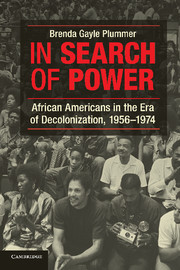Book contents
- Frontmatter
- Contents
- Figures
- Introduction
- 1 A Great Restlessness
- 2 Peace or a Sword?
- 3 “Freedom’s Struggle Crosses Oceans and Mountains”
- 4 Meeting Odinga
- 5 When Race Doesn’t Matter
- 6 Embracing the Globe
- 7 Race, Space, and Displacement
- 8 Africa and Liberation
- 9 Agenda Setting on Two Continents
- Conclusion
- Bibliography
- Index
- References
Introduction
Published online by Cambridge University Press: 05 December 2012
- Frontmatter
- Contents
- Figures
- Introduction
- 1 A Great Restlessness
- 2 Peace or a Sword?
- 3 “Freedom’s Struggle Crosses Oceans and Mountains”
- 4 Meeting Odinga
- 5 When Race Doesn’t Matter
- 6 Embracing the Globe
- 7 Race, Space, and Displacement
- 8 Africa and Liberation
- 9 Agenda Setting on Two Continents
- Conclusion
- Bibliography
- Index
- References
Summary
In late summer 1959 two aging generals and trusted staff members met for a series of candid conversations at a medieval fortress. The generals were also presidents, and the venue, the Château de Rambouillet, was the official summer home of French heads of state. Charles De Gaulle enjoyed receiving his foreign counterparts at the chateau, whose interior, resplendent with gilt and tapestries, and exterior, lush with formal gardens, reflected the grandeur of France. “Our guests,” he noted, “were made to feel the nobility behind the geniality, the permanence behind the vicissitudes, of the nation which was their host.”
De Gaulle’s guest this time was the president of the United States, Dwight D. Eisenhower, who on arriving in Paris received a hero’s welcome as the liberator of wartime Europe. While the shared experience of World War II united the two men, their talks were not limited to the past. The major powers had accepted the inevitability of decolonization by the end of the decade, but not without hand wringing. Eisenhower and De Gaulle bemoaned colonial peoples’ lack of preparation for independence. As an aide recalled the discussion, Ike declared that “often we were asked for tractors when the level of the economy required the ability to handle a plow and an ox. Many of these peoples were attempting to make the leap from savagery to the degree of civilization of a country like France in perhaps ten years, without realizing that it took thousands of years to develop the civilization which we know.” De Gaulle concurred. In spite of disagreement between the two as to how Western Europe might best be defended, they agreed that it was now vital that the West act in concert in handling the developing countries. De Gaulle ultimately consented to a French withdrawal from Algeria and Eisenhower was the first American to be so informed. Ike himself had little prior knowledge of Africa, and awkward mistakes compromised his administration’s efforts to conduct normal relations with the new states.
- Type
- Chapter
- Information
- In Search of PowerAfrican Americans in the Era of Decolonization, 1956–1974, pp. 1 - 23Publisher: Cambridge University PressPrint publication year: 2012

